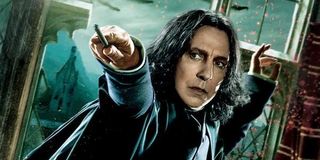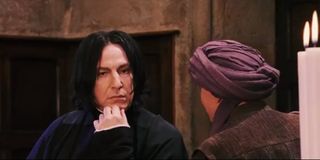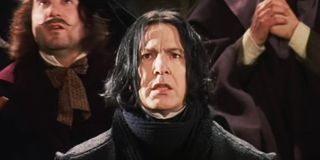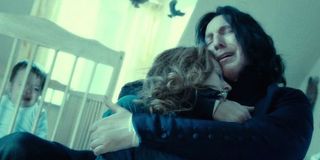Severus Snape: The Major Clues He Wasn't A Villain

This article will be filled to the Sorting Hat’s brim with SPOILERS.
Even with Harry Potter author J.K. Rowling stating on record that Severus Snape was not a bad guy, some Harry Potter fans just cannot seem to warm to the potions master. While it sounds easy to dislike a Slytherin Death Eater who killed Albus Dumbledore, there is more to Professor Snape than many of the most devoted fans even realize.
Upon further analysis, Severus Snape, portrayed in the Harry Potter films by the late Alan Rickman, is clearly an unpleasant and often feared individual, but as we later discover in Harry Potter and the Deathly Hallows: Part 2, his character is relatively misconstrued throughout the series, thanks to focusing on Harry Potter's viewpoint. Throughout the preceding films and original novels, however, there are blink-and-you-miss-it hints at Professor Snape’s true and admirable intentions.
So, if you are still confused as to why J.K. Rowling would later tweet an apology for killing Severus Snape at the end of Harry Potter and the Deathly Hallows, maybe this will help. These are clues throughout the Harry Potter movies that reveal Professor Snape was not the villain he was portrayed to be.

The Way Severus Snape Looked At Quirinus Quirrell As Harry Potter’s Scar Hurt
The first clue to Severus Snape’s true nature is actually in Alan Rickman’s very first appearance as the character during the Sorting Hat scene in Harry Potter and the Sorcerer’s Stone. When Harry Potter (Daniel Radcliffe) sees Snape for the first time, his famous lightning-bolt shaped scar begins to act up, hinting that Harry senses the danger the Slytherin professor will be to him.
This is actually a red herring. Unbeknownst to him, Harry Potter’s scar is sensing the presence of Voldemort whom, as we learn in the film’s climax, is hiding inside the body of Quirinus Quirrell (Ian Hart), who is sitting next to Severus Snape with the back of his head (where Voldemort’s face lies) facing Harry.
If you watch closely, as Harry Potter begins to react to his scar’s pain, Severus Snape notices this and quickly shoots a suspicious glance toward Quirrell. That is just the first instance of this covert battle for Harry’s life between the two professors.
CINEMABLEND NEWSLETTER
Your Daily Blend of Entertainment News

Severus Snape Tried To Stop Quirinus Quirrell’s Spell on Harry Potter’s Broom
Harry Potter’s first Quidditch match in Harry Potter and the Sorcerer’s Stone saw Daniel Radcliffe’s young wizard in a fierce competition to retrieve the Golden Snitch. Yet, it was not the only competition taking place in the Quidditch Pitch that day.
When Harry Potter’s broom starts acting faulty putting him in danger, Hermione Granger (Emma Watson) sees through her binoculars Severus Snape speaking what appears to be a jinx on his broom. She puts a stop to it by setting Snape’s cloak on fire, ceasing the jinx and allowing Harry to continue with the game.
This is another red herring, as the (literally) two-faced Quirinus Quirrell later reveals to Harry Potter that it was he who was jinxing the broom and Professor Snape was attempting to save Harry Potter with a counter-spell. It was Hermione’s fire that threw Quirrell off-guard, distracting him from finishing the job on Harry.

Severus Snape Shielded Harry Potter, Ron, and Hermione From Professor Lupin
This may be the one clue of Severus Snape’s nobility throughout the Harry Potter franchise with the most density. While it seems very simple and inconsequential to its preceding moment, it holds a lot of weight.
In Harry Potter and the Prisoner of Azkaban, from director Alfonso Cuaron, Harry Potter, Ron Weasley (Rupert Grint), Hermione Granger, Sirius Black (Gary Oldman), and Remus Lupin (David Thewlis) are taking the freshly apprehended traitor Peter Pettigrew (Timothy Spall) to the Dementors. When a full moon is revealed, Lupin’s inner werewolf is awakened and, unable to control the transformation, he throws Sirius, attempting to counteract the awakening, out of his way.
Arriving on the scene at the peak of Lupin’s transformation is Severus Snape, appearing vengeful toward to Harry Potter for attacking him at the Shrieking Shack, until he notices what is at stake at the moment. He turns to face Lupin, acting as a shield for Harry, Ron, and Hermione before Sirius appears in his werewolf state to suppress Lupin.
It may seem typical for a Hogwarts professor who wants to keep his job to offer protection to his own students, but if Severus Snape was truly as wicked as he seemed, he would not have put himself directly in the line of danger for them. This was Professor Snape thoughtlessly engaging in his own protective instincts to ensure Harry Potter’s survival.

The Hesitation In Severus Snape’s Voice As He Killed Albus Dumbledore
One of the most tragic moments of the entire Harry Potter series is at the climax of Harry Potter and the Half-Blood Prince when Severus Snape prevents Draco Malfoy (Tom Felton) from killing Albus Dumbledore (Michael Gambon) by killing him himself. It is a shocking, saddening scene that, at first glance, cements our suspicions of Snape’s villainous motivations.
Yet again, Severus Snape is the victim here of a perplexing red herring. It is revealed two movies later (or one extremely long book later) in Harry Potter and the Deathly Hallows: Part 2 when Harry Potter views the slain Snape’s memories that the professor murdering Albus Dumbledore was a plan between the two of them all along.
Dumbledore was already dying as the result of a curse put on his ring when he learned that Voldemort (Ralph Fiennes) had enlisted Draco Malfoy to kill him. Believing that it would help Snape earn Voldemort’s trust, Dumbledore instructs him to be the one to kill him.
Severus Snape’s own reluctance to take Dumbledore’s life is apparent in the moment itself. Dumbledore’s plea to Snape before his death is for him to finish the job. If you listen closely to Snape as he exclaims “Avada Kedavra” (a murderous spell), you can hear a quiver of hesitation in his voice as he knows this will be the last time he will see his friend.

Harry Potter’s Resemblance To His Parents Gives Severus Snape PTSD
The biggest argument fans use to prove Severus Snape’s villainy is his clear dislike of Harry Potter. The professor is feared by most non-Slytherin students due to his staunch disciplinary tactics and ominous aura, but throughout the series, he has shown a particular disdain toward the boy and everything he stands for.
Severus Snape’s unpleasant demeanor toward Harry Potter is not out of blind hatred. Truly, it is out of an inner conflict that rests within himself.
In Harry Potter and the Deathly Hallows: Part 2, Severus Snape’s memories reveal that he fell in love with Harry’s mother Lily at a young age, even before they both attended Hogwarts. He grew bitter upon learning that Lily preferred James Potter, a man who publicly ridiculed and humiliated him as a student, over him.
It is said by many that Harry Potter shares a distinct resemblance to his father, but also has his mother’s eyes. Every time Severus Snape looked at Harry, he saw both a man he hated and the woman he loved. The burden this perfect storm of memories would conjure is unimaginable for most of us.
The late Alan Rickman was actually one of the few people other than J.K. Rowling to learn about Severus Snape’s secrets long before the seventh Harry Potter book had even been published. With his wicked snarl and menacing tone, he made it easy for one to assume he was an agent or treachery, all the while knowing the truth. It makes for a perfect portrayal.
Severus Snape made it his lifelong duty to protect Harry Potter out of his undying love for his late mother, but projected his hatred of James Potter onto Harry as a way of keeping it a secret. Rarely are heroic figures of literature or film this complex, which must be why his heroism so often goes tragically overlooked.

Jason Wiese writes feature stories for CinemaBlend. His occupation results from years dreaming of a filmmaking career, settling on a "professional film fan" career, studying journalism at Lindenwood University in St. Charles, MO (where he served as Culture Editor for its student-run print and online publications), and a brief stint of reviewing movies for fun. He would later continue that side-hustle of film criticism on TikTok (@wiesewisdom), where he posts videos on a semi-weekly basis. Look for his name in almost any article about Batman.
Most Popular






